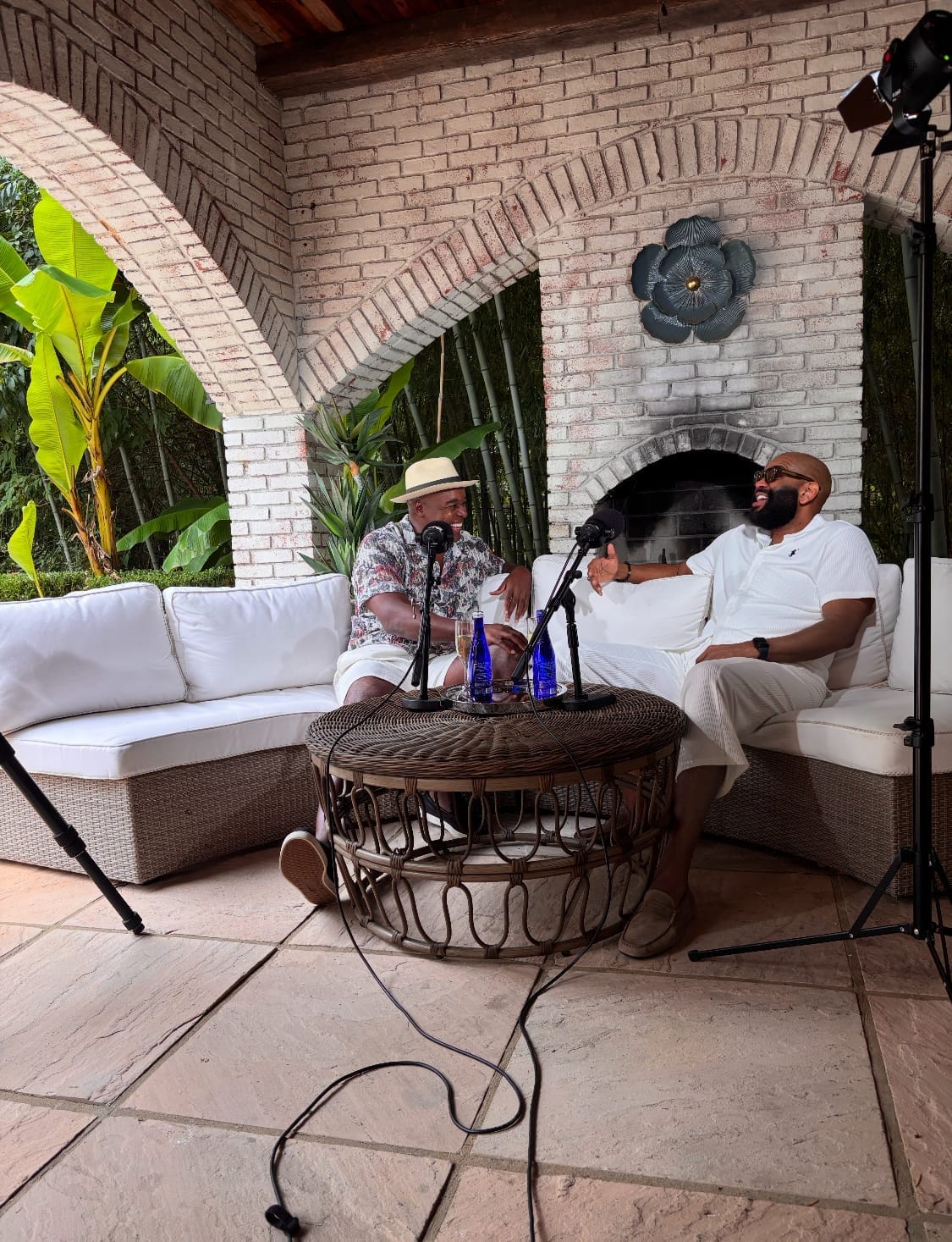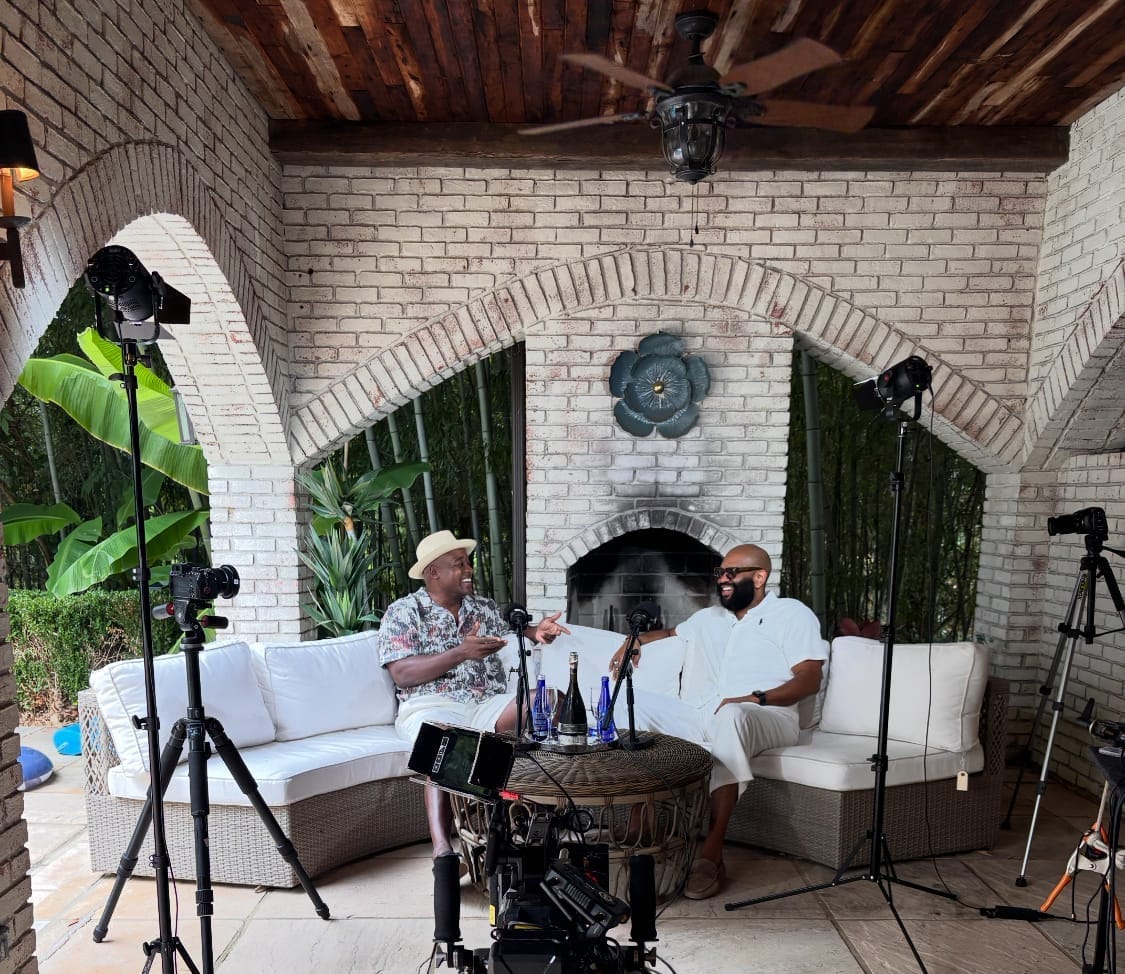ALPHA
MAGAZINE
Breaking the Hustle Culture: Inside the Partnership of Dr. Maurice Stinnett and Ronald Ndoro Mind
written by
JUSTINE SLATER & CLINT PORTE
Atlanta can be disarming in its charm. The air hums with ambition, the energy is kinetic, but beneath it all there’s an ease—a certain calm that only appears when people stop pretending and start building. It was in that atmosphere, at a Special ALPHA Magazine Experience shoot, that two men from opposite worlds sat down for what was meant to be a brief conversation that would ultimately illustrate over six combined decades of experience and resilience.
Dr. Maurice Stinnett and Ronald Ndoro Mind are the kind of men whose presence shifts rooms. Stinnett, born in Springfield, Ohio, carries himself with the calm precision of a scholar, though his résumé reads more like a roadmap through the engines of culture: Princeton, Columbia, the NBA, Warner Music Group. He speaks with the cadence of someone who has learned to carry power with a strong sense of control, as though it’s simply another language in which he is fluent. Ndoro Mind, by contrast, radiates an effortless cool—the smooth confidence of a man who has built entire worlds out of his imagination. Growing up in the UK, Ronald walked away from a career in law to build London’s nightlife from the ground up, created luxury members’ clubs and cabaret shows, and now runs le.haus, a private travel club scattered across the Caribbean.
Their worlds should never have intersected. Yet here they are, launching a joint venture: a podcast, Existential Thoughts, devoted to dismantling the myth of the hustle and reimagining what ambition could look like if it weren’t synonymous with exhaustion. Inspired by the author, Tricia Hersey, a black female wordsmith who penned the book, “Rest is Resistence.” Dr. Stinnett and Mr. Ndoro Mind both repeat Hersey’s words with a kind of radical softness: rest is not a reward.
Rest is survival.

They first met at an exclusive TSP conference in Atlanta for entrepreneurs—two names on a list, two powerhouses orbiting separate spheres. Stinnett was invited by his business manager, Michelle Richburg of Richburg Enterprise, while Ndoro Mind was extended an invitation by a mutual friend, Natasha Green. “Within thirty minutes we were talking like old friends,” Ronald says. “Maurice mentioned he’d worked at the NBA. I told him I knew someone there—Yao Williams. He goes, ‘That’s my cousin.’ We took a photo, sent it to Yao, and he replied, ‘Why are you together and I’m not invited?’ It was surreal. From that moment, we just didn’t stop.”
What followed was less of a collaboration and more of an orbit shifting into alignment. Maurice, who once charted a clear, orderly path toward becoming a university president, speaks about how life rerouted him into the NBA and later the music industry. “I didn’t have those things on my radar,” he says. “They had me on theirs.” He grew up in humble surroundings with a single mother, and credits education with saving his life. Princeton, though, shook him. “I felt like a fish out of water. The other Black students weren’t like me—
—they came from wealth, from legacy. I came from very little in comparison. It wasn’t until someone told me, ‘You are enough,’ that I realized I belonged. I became student body president. I worked with President Obama. I learned to walk into rooms like I belonged—because I did.”
Ronald’s journey was more of a meander. He was meant to be a lawyer, and even made it to one of the world’s top firms before walking out three months later. “By then I was already making more [money by] throwing parties,” he laughs. “I’ve always had that entrepreneurial spark. At fifteen, I broke into the school print room at night to make flyers, threw a party, and walked away with five grand. By the time I graduated, I was running concerts and venues. My mom still told people I was a lawyer for twenty years. She didn’t understand what I did—but she liked the title.”
If Maurice embodies methodical reinvention, Ronald is fearless spontaneity. They describe their partnership as “a marriage,” one they are still learning how to navigate. “We’re both dominant personalities,” Ronald says. “The key is communication—knowing how to say, ‘You see it this way, I see it that way, how do we keep moving forward?’” Maurice nods. “Our honeymoon phase is over. Now we’re finding our rhythm.”
They talk about each other with the warmth of brothers. “Ronald is a visionary,” Maurice says. “He sees the big picture before I even know where the door is. He’s collaborative, brilliant under pressure, and he never lets the heat throw him off.” Ronald smiles at this. “Maurice has a brilliant mind. The way he processes, the way he probes and structures a conversation—it’s beautiful. And he’s a cheerleader. He lifts everyone around him.”
Existential Thoughts is an extension of that shared energy—a place where they can model the kind of success that doesn’t require self-erasure. The podcast will be followed by retreats that blend Ronald’s mastery of luxury hospitality with Maurice’s background in leadership development: curated spaces for deep conversation, personal recalibration, and radical permission to slow down. In collaboration with ALPHA Magazine, Dr. Stinnett and Mr. Ndoro Mind have aimed to create a private club to elevate their brand and launch a bevy of exciting projects planned together.“We’ve both been overachievers,” Maurice says. “We’ve both been burned out. But what if rest wasn’t the break at the end—what if it was the strategy?”

Their philosophies were forged in pressure. Maurice remembers being the only Black executive in the C-suites of major corporations, surrounded by people who had done far less to get there. “By then, Princeton and Columbia had built that muscle in me. I knew I belonged. I wasn’t going to shrink to comfort anyone’s insecurity.” Ronald describes subtler battles in the UK, where racism is quieter, more coded. “I’d be the Black owner leading a team of white people, and when something happened, I’d think—would this have happened if I were white? You don’t always know. So you build your own confidence, because otherwise it will eat you alive.”
“Confidence is earned,” Maurice says. “And humility is how you earn it. Humility is a superpower. It lets you say, ‘This man has something I need.’ That’s not weakness—that’s strength.”
They both measure success not in titles but in freedom. Maurice recalls the moment he knew he had made it—not at the NBA, not even signing his Warner Music contract, but when he called his grandmother. “I told her she’d never have to work again,” he says, his voice softening. “She cried. She never showed emotion. But I heard relief in her voice. Relief. Nothing will ever top that.” Ronald frames success differently, as a continual state of becoming. “I’ve always followed what felt alive,” he says. “The beauty of an idea. Seeing what something could become before it becomes it. That’s the joy.”
Watching them speak, what stands out isn’t their résumés but their reverence for each other. They seem almost surprised by the depth of their connection, as if they hadn’t realized how rare it is to be seen so clearly by someone new. “As you get older, your circle gets smaller,” Maurice says. “You get rigid, closed off. Meeting Ronald was like a breath of fresh air. He pushes me to be better in ways no one else has.” Ronald nods. “Energy-wise, we just clicked. We think the same questions at the same time. It’s rare. And it’s made me better.”

And yet, beneath all the mutual admiration and ambition, there’s a striking vulnerability in how they speak about the future. They don’t talk in metrics or projections; they talk about purposefulness. About legacy. About creating work that outlasts their own names. “We want to build something that gives people permission to be human again,” Ronald says. “To show that you can win without burning yourself down in the process.” Maurice adds, “It’s not about being the loudest voice in the room anymore. It’s about building rooms where more voices can speak—and rest—without fear.”
That ethos is why their retreats, set to be hosted at Ronald’s Spaces across the Caribbean, will feel less like corporate workshops and more like sanctuaries: curated spaces where achievement isn’t measured in productivity, but in presence. They imagine secluded villas where high-performing leaders can unplug, reset, and relearn how to listen—to themselves, to their peers, to silence. It’s a radical notion in a culture that mistakes motion for progress. But that’s precisely the point. “People think slowing down means falling behind,” Maurice says. “But slowing down is how you last.”
Existential Thoughts may begin as a podcast, but it is clear this is only the seed of something larger. A philosophical pivot. A reclamation of time, energy, and worth. They want to prove that ambition doesn’t have to cost your peace—that in fact, peace might be the most audacious form of ambition there is. In their world—and soon, perhaps, in ours—rest is not the end of ambition. It is the force that keeps it alive.
credits
in
interviewed by
Justine Slater - @whoisjustinejustine
photographer
Clint Porte - @paper.clint
creative director
Justine Slater - @whoisjustinejustine
set director
Justine Slater - @whoisjustinejustine
wardrobe stylist
Drew Nicole - @curatedbydrew
editor in chief
Luciano Layne - @iamlucianolayne
THE NEWSLETTER
Subscribe to the Alpha Magazine newsletter to stay informed, hipped and aware of all things happening in the Alpha brand. This includes exclusive news & events, products and promotions. You may opt-out of our newsletter, hassle-free.
YOU MIGHT ALSO LIKE
RESOURCES
LOS ANGELES, CA
